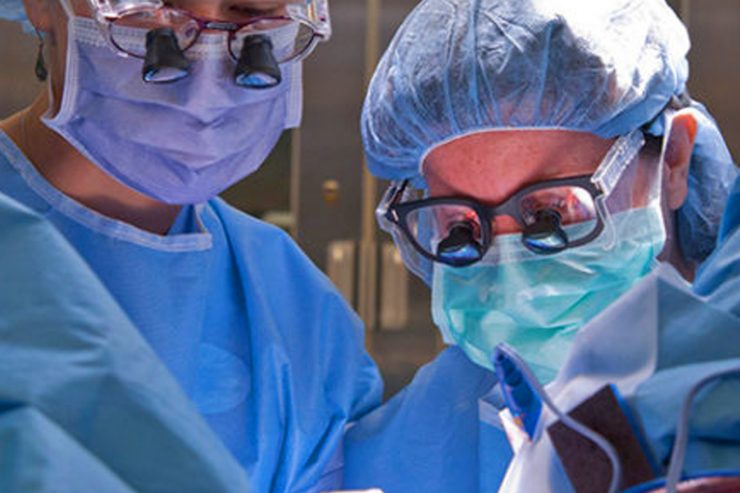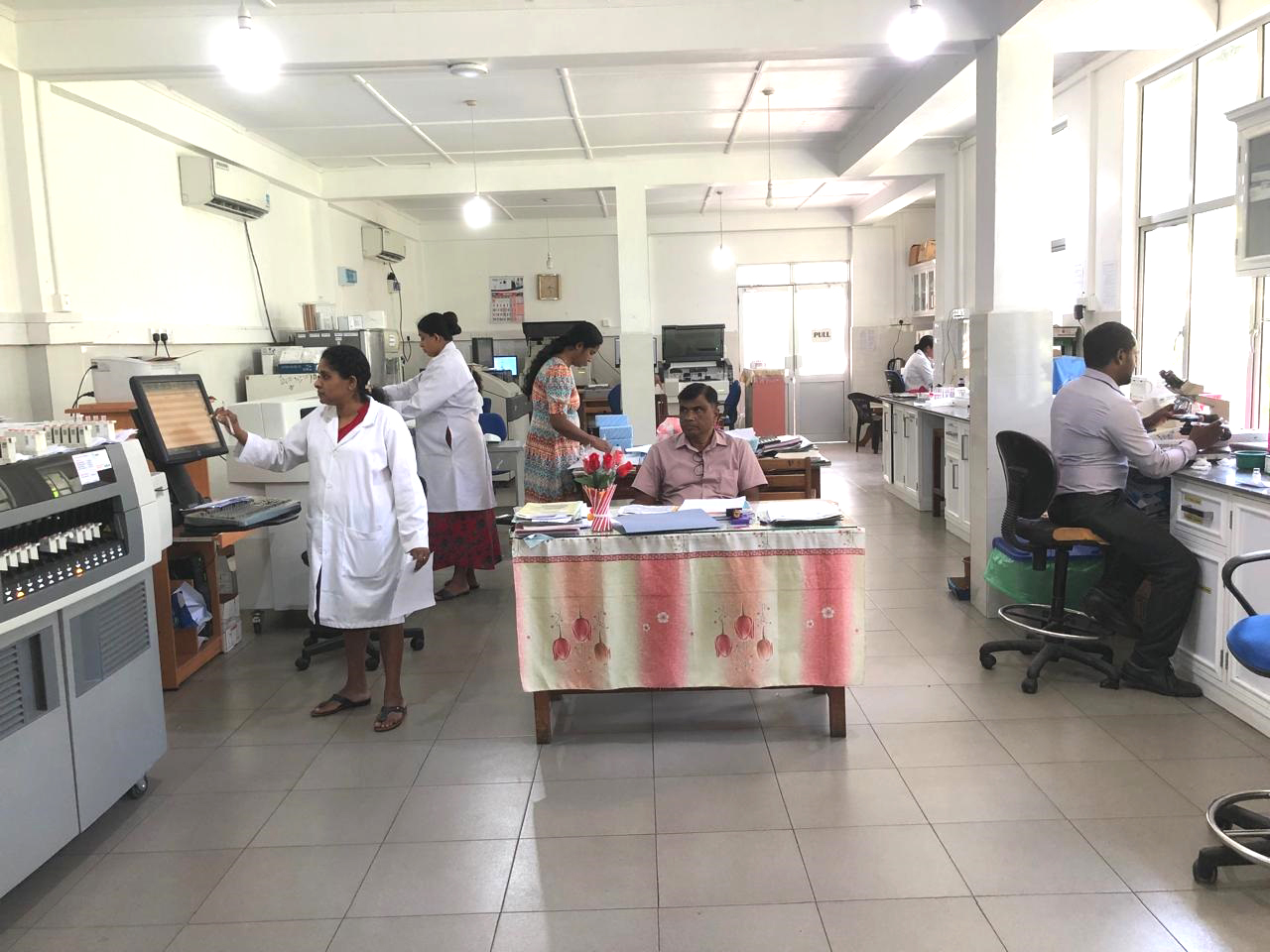

ABOUT THIS DEPARTMENT
- Date 11 Jun 2016
- Ward Number Laboratory Complex
- Staff 5 Consultants, 42 MLTs, 6 Lab Ordely, 14 SKS,
ABOUT THIS DEPARTMENT
A medical laboratory system is essential part of the healthcare system, playing a pivotal role in diagnosing, monitoring, and preventing diseases. It serves as a hub where patient samples such as blood, urine, body fluid or tissue are analyzed to provide critical data for medical decision making through delivering accurate, timely and reliable diagnostic results, supporting patient care and advancing medical researches.
As Teaching Hospital Badulla, we are equipped with advanced instruments and managed by qualified and well-trained professionals including consultants (MBBS and MD), doctors (MBBS) and medical laboratory scientists (Bsc MLS (Hons) and Higher diploma in medical laboratory technology). Health care assistants play an essential behind – the – scenes role in ensuring that the lab functions smoothly. Our laboratory operates as five main distinct units including,
Chemical Pathology | Haematology | Histopathology | Microbiology |Virology
We provide a comprehensive range of tests, from routine tests to specialized genetics analysis, helping clinicians to accurately diagnose conditions and to monitor treatment progress. Our unit is pleased to offer 24× 7 service around to deliver high quality services, serving both hospital settings and out stations like Welimada, Mahiyanganaya, Diyathalawa, Moanaragala, bibila and wellawaya hospitals. The department of pathology, Teaching Hospital Badulla, recognized as the major laboratory service in Uva province. So that, we are the forefront of diagnostic excellence.
The quality control is the cornerstone of laboratory operations, ensuring that all tests are reliable and precise. Our daily internal quality checks ensure consistent performance of equipment and procedures, while external quality control verifies the accuracy of the results.
As the pathology laboratory of a teaching hospital, there are ongoing advancements and developments in order to continually enhance our services and care. we are planning to digitalize our laboratory information system [LIMS] that manages patient data, sample tracking, test results and reporting. Moreover, turnaround time [TAT] to be optimized for different tests to ensure timely reporting of results. In the near future, fully laboratory automation will transform laboratories by automating routine tasks with enhancing accuracy and precision. As a teaching hospital, always we are ready to open doors for new technologies. We are committed to prioritize skill development and training of our team. We will expand opportunities for them to participate innovative works shops, hands–on training and local and international conferences related to field of clinical laboratory science, ensuring access to the latest knowledge and techniques in the field.
We work together as a dedicated team, conducting a large number of tests each year with great efficiency. Below are our annual statistics, based on the last five years.
| Laboratory | The average amount of annual tests |
| Chemical pathology | 1,014,050 |
| Haematology | 269,488 |
| Microbiology | 150,424 |
| Histopathology | 34,866 |
| Virology | 3851 |
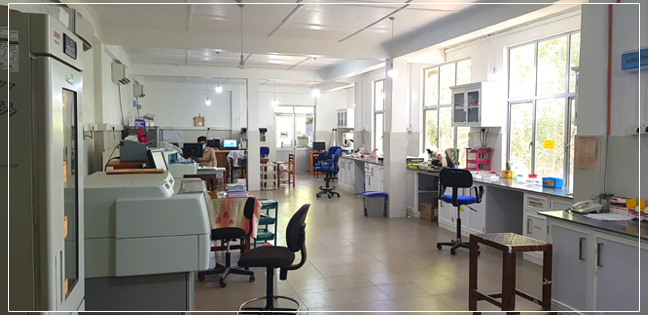


Future Plan : According to Hospital Master Plan – project proposal submitted to request for a new Laboratory complex with latest technology & academic facilities
Administration

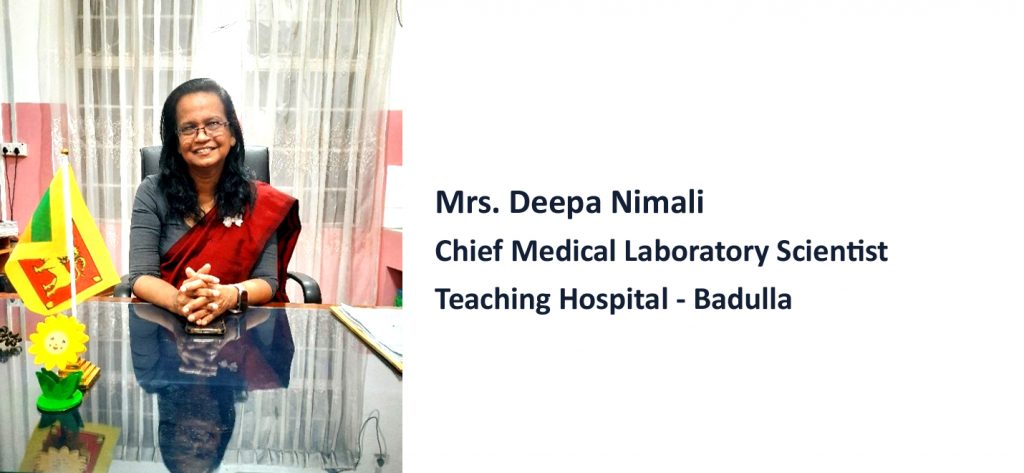
Procurement & Supply Unit


In a medical laboratory system, Procurement and Supply Unit (PSU) is area designated for the storage of essential materials, reagents, and equipment. Proper organization and maintenance of laboratory PSU is critical to ensuring smooth operations, maintaining quality control, and meeting regulatory requirements. Below are the main categories of PSU.
- Chemical/Reagent Store
- Equipment Store
- Consumable Store
- Documentation Store
Here we practice inventory management, labelling and documentation, compliance, and proper training for best laboratory stores as properly organized and maintained stores ensure efficiency, safety, and compliance in a medical laboratory.
As Teaching Hospital-Badulla, we primarily receive supplies from Medical Supply Division (MSD), Health ministry, Colombo since we are part of the government sector. In addition, some consumables, such as reagents, are supplied by the private sector (local purchase) with the permission of the MSD.

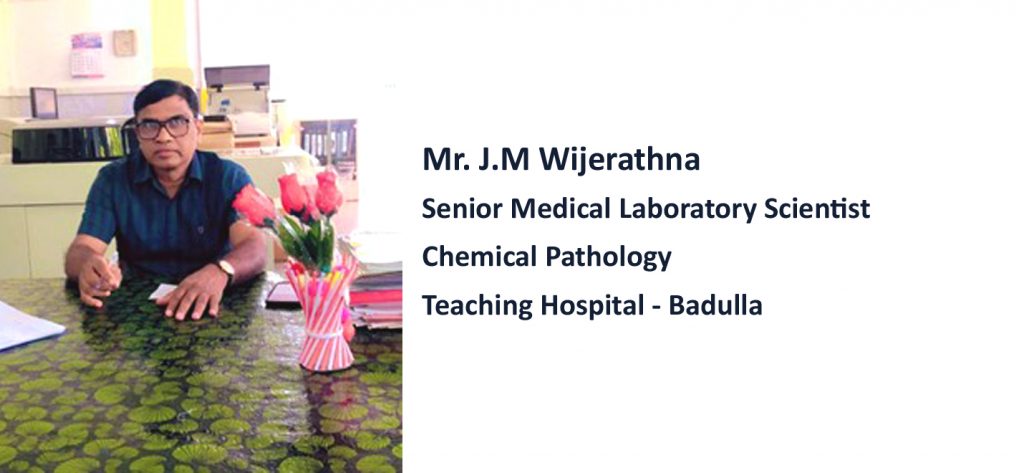
 Clinical biochemistry laboratory plays a vital role in evidence-based medicine. This unit carries the highest workload in the laboratory. The chemical pathology department TH-Badulla performs routine tests to highly specialized tests, using advanced and sophisticated methodologies using fully automated analyzers. Most common routine tests perform here are blood glucose levels, CRP (C-Reactive protein), renal profile, Liver profile, lipid profile etc….
Clinical biochemistry laboratory plays a vital role in evidence-based medicine. This unit carries the highest workload in the laboratory. The chemical pathology department TH-Badulla performs routine tests to highly specialized tests, using advanced and sophisticated methodologies using fully automated analyzers. Most common routine tests perform here are blood glucose levels, CRP (C-Reactive protein), renal profile, Liver profile, lipid profile etc….
Special biochemistry tests include serum and urine osmolality, serum protein electrophoresis and immunoassays (Hormone assays, Cardiac markers, Tumor markers ,25-OH vit D and serum ferritin). Body fluid analysis such as CSF, knee joint fluid, pleural fluid and acsitic fluid are also done by well-trained MLTs for microscopy in the laboratory.
For conditions such as diabetes, hypertention and renal failure clinical biochemistry plays a key role in monitoring disease progression and treatment efficacy. Lipid profile can signal the risk of cardiovascular disease, allowing for preventive measures like life style changes or medications. Hormone assays are pivotal in diagnosing and managing endocrine disorders.
We perform third party internal quality control on daily basis and external quality control on monthly basis on both biochemical and immunoassay testings to ensure accurate and precise laboratory reports.
Investigation panel – Chemical pathology
1st line investigations
.
| Plasma sugar (FPG, RPG, PPPG, OGTT) | CRP |
| SE (Na+, K+, Cl–) | BU |
| S.Cr | SGOT |
| SGPT | UFR |
| Urine ketone bodies | CSF full report |
2nd line investigations
.
| Bilirubin (Total, fractionations) | Total protein |
| Albumin | ALP |
| GGT | Amylase |
| Albumin corrected total calcium | Serum Mg |
| Urinary electrolytes (Na+, K+, Ca2+, Mg2+) | Total Cholesterol |
| Urinary creatinine | Triglycerides |
| Urinary Bence Jones protein | |
| Full report of body fluids (Pleural, Peritoneal, pericardial, joint, cystic etc.) |
3rd line investigations
.
| LDH | |
| CPK | |
| Uric acid | |
| UPCR | |
| Spot urine Ca2+, Mg2+, Uric acid | |
| Serum/urine osmolality | |
| 24 hour urinary Ca2+, Mg2+, Uric acid, Protein, creatinine clearance | |
| Lipid profile | |
| Serum protein electrophoresis/iFIX |
--------
General Clinical Pathology
--------
Immunoassay
1st line investigations
.
- hs-Troponin I
- TSH
- FT4
- Cortisol
- Beta hCG
- Ferritin
2nd line investigations
.
- FT3
- LH
- FSH
- Prolactin
- CA125
- PSA
3rd line investigations
.
- AFP
- CEA
- Testosterone
- iPTH.
--------
Emergency Laboratory – Clinical Pathology Tests
- SE – (Na+, K+)
- Cr
- BU
- AST
- ALT
- Ca2+
- CRP
- Amylase
- Serum Bilirubin – Total, Direct
- UFR
- CSF full report
- hs-Troponin I
--------
Send Away Samples - (Samples are sent on Sundays and Tuesdays)
- 17-OHP
- Alpha1 antitrypsin
- Anti TPO Ab
- BNP
- Ceruloplasmin
- Choline-esterase
Apeksha Hospital Maharagama
- Serum free light chain assay
- Thyroglobulin / Anti Tg
- Calcitonin
- CA 19.9
- Chromogranin A
- Urine protein electrophoresis/urine immunofixation
- Procalcitonin – Inform Chemical Pathologist/MOs prior
- Insulin
- C-peptide
- DHEAS
- Estradiol
- Growth hormone (GH)
- Iron studies – Iron, TIBC, UIBC, Transferrin saturation
Lady Ridgeway Hospital (for selected patients only, patients who are suspected to be having inborn errors of metabolism)
- Plasma amino acid
- Urine organic acid
- White blood cellular enzymes
- Genetic studies
- Porphyrins (PBG and plasma porphyrins)
- IGF-1
- Progesterone
- SHBG
- Vitamin B12
- Urine VMA
- Urine total metanephrines
- Haptoglobin
National Hospital Kandy
- Tacrolimus
- Cyclosporin
- ACTH and ARR – (patient should be sent from the relevant ward to NH-Kandy)
- Lithium


 Department of Haematology TH-Badulla is responsible for the diagnosis of disorders related to red blood cells, white blood cells, platelets and coagulation system in adults and children.
Department of Haematology TH-Badulla is responsible for the diagnosis of disorders related to red blood cells, white blood cells, platelets and coagulation system in adults and children.
Routine blood investigations are Full blood count (FBC), Erythrocyte sedimentation rate (ESR), Blood pictures, Prothombin time (PT INR), Activated partial thromboplastin time (APTT) etc. These investigations help detect and monitor diseases like anaemia, thrombocytopenia leukaemia, lymphoma and bone marrow disorders. Coagulation studies use to diagnose haemophilia and other bleeding disorders and monitoring wafferin in deep vein thrombosis( DVT) etc. Haematological tests including FBC and coagulation tests are also part of routine pre- surgical assessments to ensure patient’s blood is functioning normally.
Furthermore, Haemoglobin electrophoresis, Bone marrow biopsies, brewer’s test, osmotic fragility test, Ham’s test and special stains( Iron, Sudan black B) are considered as special haematological investigations performed here. Haemoglobin electrophoresis plays a key role in the management and treatment of Sickle cell disease, thalassemia and other haemoglobinopathies.
Advanced and sophisticated machines & techniques are used to perform these tests providing accurate and timely laboratory reports. We perform internal quality control on daily basis and external quality control on monthly basis to ensure accurate and precise laboratory reports.

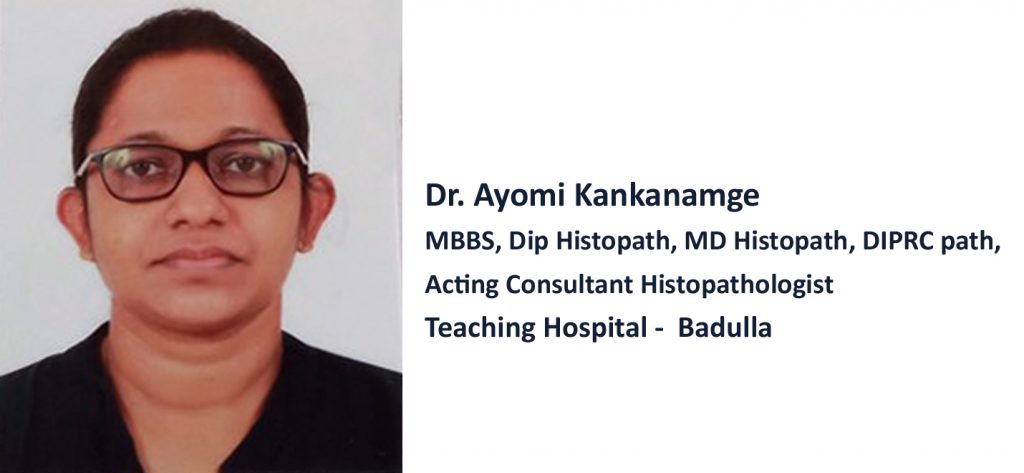
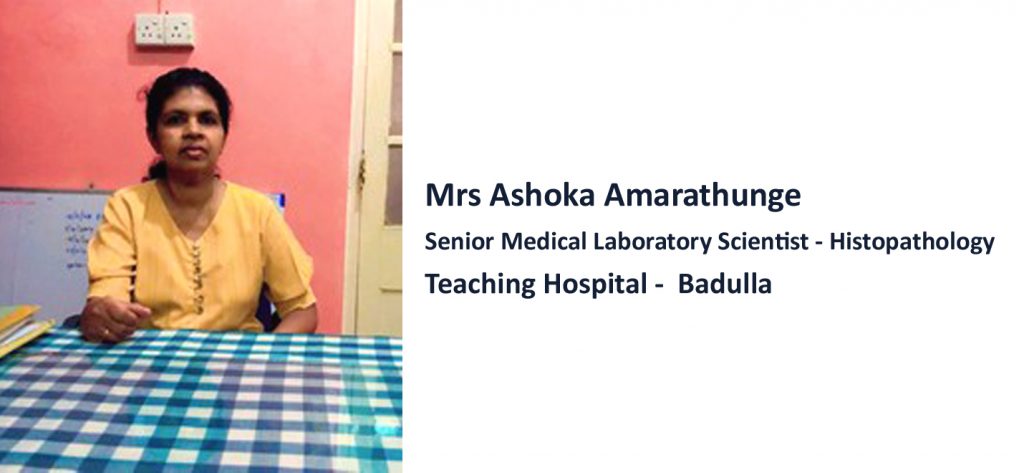
 Department of Histopathology laboratory plays a crucial role in modern medicine by providing detailed and accurate diagnoses that guide treatment decisions, basically histological and cytological disease diagnosis. Histology is central to oncology for confirming the presence, type and the grade of cancer. In cancer care, the histological diagnosis helps determine the appropriate treatment, including surgery, radiation, chemotheraphy or targeted therapies.
Department of Histopathology laboratory plays a crucial role in modern medicine by providing detailed and accurate diagnoses that guide treatment decisions, basically histological and cytological disease diagnosis. Histology is central to oncology for confirming the presence, type and the grade of cancer. In cancer care, the histological diagnosis helps determine the appropriate treatment, including surgery, radiation, chemotheraphy or targeted therapies.
Tissue examinations, Cytology tests (body fluids & FNAC), Immunohistochemistry tests (IHC), PAP smear screening (Entire Badulla MOH areas) and special stains are performed here. Furthermore, this laboratory plays an important role in autopsies, helping to determine the cause of death by examining tissue changes that indicate disease or tauma. Imprints are often used during surgeries to provide immediate feedback about the nature of the lesion (benign or malignant) while the patient is still in operating room.
Teaching hospital Badulla, is one of the few hospitals in Sri Lanka offering immunohistochemistry services. Using immunohistochemistry, earlier and more accurate cancer diagnoses can lead to better treatment outcomes, personalized care & improved survival rates.
By providing PAP smear screening, we give great service as a critical tool for early detection of cervical cancers.

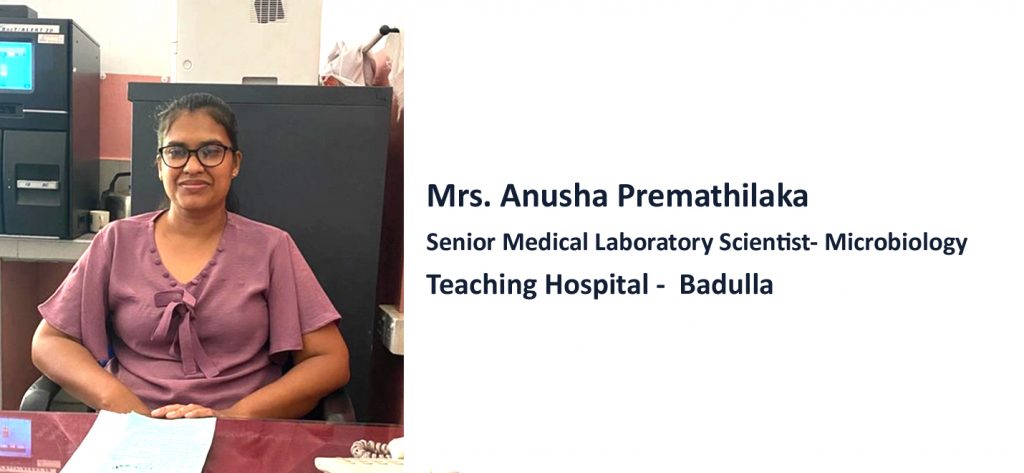
 Microbiology laboratory, Teaching hospital Badulla, conducts range of laboratory tests focused on identifying pathological microorganisms. Basicaly this unit performs bacterial cultures of blood, urine, respiratory specimens, sterile fluids, pus aspirations, tissues and stools.
Microbiology laboratory, Teaching hospital Badulla, conducts range of laboratory tests focused on identifying pathological microorganisms. Basicaly this unit performs bacterial cultures of blood, urine, respiratory specimens, sterile fluids, pus aspirations, tissues and stools.
This unit plays a pivotal role in diagnosing life – threatening infections such as sepsis and meningitis. Antibiotic susceptibility testing according to CLSI, ensures that patients receive the appropriate antibiotics, thereby avoiding unnecessary antibiotic use and minimizing the development of antimicrobial resistance (AMR).
VITEK 2 automated system is used for advanced identification of microorganisms, especially in cases of MDR (Multiple drug resistant) organisms. Teaching hospital Badulla is one of the key centers in Sri Lanka for Genexpert MTB/RIF PCR testing, particularly for Uva province. This test enables the rapid detection of mycobacterium tuberculosis and identifies rifampcin resistance in patients.
Testing and screening are done in this department for diagnosing, preventing and monitoring infections in the hospital settings. The quality assurance and quality improvement are ensured through internal quality control and external quality assessment (EQA) from Medical Research Institute.


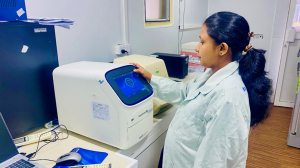 A medical virology laboratory is a specialized lab focused on diagnosing, monitoring, and researching viruses that affect human health. These labs are critical for detecting viral infections, understanding viral diseases and aiding in the development of antiviral therapies and vaccines. They provide essential support in clinical settings and public health by identifying pathogens, guiding treatment, and controlling the spread of infections. Specially during Covid-pandemic our laboratory provided huge service in Uva region.
A medical virology laboratory is a specialized lab focused on diagnosing, monitoring, and researching viruses that affect human health. These labs are critical for detecting viral infections, understanding viral diseases and aiding in the development of antiviral therapies and vaccines. They provide essential support in clinical settings and public health by identifying pathogens, guiding treatment, and controlling the spread of infections. Specially during Covid-pandemic our laboratory provided huge service in Uva region.
In the virology laboratory, viruses are isolated and identified, using common techniques include PCR (Polymerase Chain Reaction) and rapid tests. Covid 19 PCR testing, Dengue antigen and antibody tests and hepatitis B surface antigen test are currently being conducted at this laboratory. The remaining virology tests are sent to MRI ,National hospital Kandy, Apeksha hospital Maharagama. This laboratory is equipped with advanced PCR instruments, capable of performing wide range of testing. As a teaching hospital we are planning to expand our capabilities by offering wide range of PCR tests in the near future.



